4 Oct 2018 | Awards, Cuba, Fellowship, Fellowship 2018, News, Press Releases
[vc_row][vc_column][vc_single_image image=”102925″ img_size=”full”][vc_column_text]The UK has overturned a decision to refuse visas to two award-winning Cuban artists who had been invited to take up a two-week artistic residency in Britain.
Luis Manuel Otero Alcántara and Yanelys Nuñez Leyva, winners of this year’s Index on Censorship Freedom of Expression Awards for Arts, were told last month their visa request had been denied — the second refusal this year. The artists had been scheduled to attend Index’s award ceremony in London in April but were denied visas to attend.
Alcántara and Nunez are founders of The Museum of Dissidence, a public art project and website celebrating dissent in Cuba. Set up in 2016, the museum organises radical public art projects and installations, concentrated in the poorer districts of Havana. This year, the two have been granted visas to Argentina, Chile, the Czech Republic, and the United States.
They were called to the UK embassy in Havana on October 2 and told the visa would be granted after all having “reevaluated” their application.
Jodie Ginsberg, Index on Censorship chief executive said: “Fortunately the UK has realised its mistake and reversed what was clearly an unfair decision. Government ministers talk repeatedly of freedom of speech as a key British value so it’s critical the UK demonstrates it in practice. Denying visas to artists who have faced oppression in their own countries for speaking out simply emboldens the oppressor.”
Last month, Cuban authorities arrested Nuñez and Alcantara for their role in organising a concert against Decree 349, a vague law that will give the government more control over the display and exchange of art. The law, due to come into force on 1 December 2018, gives the Ministry of Culture increased power to censor, issue fines and confiscate materials for work of which they do not approve. The pair were beaten during their detention.
It was the second arrest in three weeks for Alcantara in relation to Decree 349.
Nunez and Alcantara – will now be able to take up most of their planned two-week residency in Southend with Metal, an organisation that champions artistic innovation and provides practical support to artists, as well as receive in person their Freedom of Expression Award.
Colette Bailey, CEO and Artistic Director of Metal, said: “Metal are absolutely delighted that the decision not to allow Nunez and Alcantara to visit the UK as part of an artistic exchange has been overturned. We are very excited to welcome them in the coming weeks to Southend on Sea as part of our International Artists in Residence programme and are now busy preparing for their stay during which they will meet our local and regional artistic communities.”
Nunez and Alcantara were originally refused their visas on the grounds of insufficient evidence they would be able to support themselves financially during their stay.
“We had provided ample evidence of the support they would receive and that Index would stand as guarantor,” said Index on Censorship’s fellowships and advocacy officer Perla Hinojosa. “We have run our awards for nearly 20 years and never had any of our winners overstay or breach their visa terms. We’re so pleased the UK recognised how important it is to be able to welcome groups like the Museum of Dissidence to the UK.”
In August, directors of some of Britain’s biggest festivals signed a letter calling for the government to make its “overly complex” visa application process more transparent, after a surge in refusals and complications for authors, artists and musicians invited to perform in the UK.[/vc_column_text][/vc_column][/vc_row][vc_row][vc_column][vc_basic_grid post_type=”post” max_items=”12″ style=”load-more” items_per_page=”4″ element_width=”6″ grid_id=”vc_gid:1538647532051-bd795fb1-e996-5″ taxonomies=”23707″][/vc_column][/vc_row]
26 Sep 2018 | Awards, Fellowship, Fellowship 2018, News, Press Releases
[vc_row][vc_column][vc_video link=”https://youtu.be/-UpVto-2Sf0″][vc_column_text]The UK has refused visas for a second time to two award-winning Cuban artists who had been invited to take up a two-week artistic residency.
Luis Manuel Otero Alcántara and Yanelys Nuñez Leyva, winners of this year’s Index on Censorship Freedom of Expression Awards for Arts, had also been due to collect their award. They had been scheduled to receive their honour in April at the Index award ceremony in London but were denied visas to attend.
“We had hoped that – having been recognised with this award, and given the fact Luis Manuel and Yanelys have been granted visas to Argentina, Chile, the Czech Republic, and the United States this year – the UK government would give them the opportunity to visit the UK,” said Index on Censorship Fellowships and Advocacy Officer Perla Hinojosa.
Alcántara and Nunez are founders of The Museum of Dissidence, a public art project and website celebrating dissent in Cuba. Set up in 2016, the museum organises radical public art projects and installations, concentrated in the poorer districts of Havana.
Last month, Cuban authorities arrested Nuñez and Alcantara for their role in organising a concert against Decree 349, a vague law that will give the government more control over the display and exchange of art. The law, due to come into force on 1 December 2018, gives the Ministry of Culture increased power to censor, issue fines and confiscate materials for work of which they do not approve. The pair were beaten during their detention.
It was the second arrest in three weeks for Alcantara in relation to Decree 349.
“The UK makes much of its support for freedom of expression,” said Index on Censorship chief executive Jodie Ginsberg. “But while it talks the talk, it fails to walk the walk. Denying visas to artists who have faced oppression in their own countries for speaking out simply emboldens the oppressor.”
In August, directors of some of Britain’s biggest festivals signed a letter calling for the government to make its “overly complex” visa application process more transparent, after a surge in refusals and complications for authors, artists and musicians invited to perform in the UK.
Signatories of the letter included Nick Barley, the director of Edinburgh international book festival, and Chris Smith, the director of Womad after both went public with their festivals’ attempts to get visas for authors and musicians.
Yana Peel, CEO of the Serpentine Galleries and a judge of this year’s Freedom of Expression Awards said: “This is extremely disappointing news. Artists from overseas are being unfairly treated by the current visa system and it is beginning to have a significant impact on our programmes and events. In today’s climate, it is especially important that artists coming to Britain know that they are welcome.”
Nunez and Alcantara – who had been due to take up a two-week residency with Metal in Southend – were refused their visas on the grounds of insufficient evidence they would be able to support themselves financially during their stay.
“That’s nonsense,” said Hinojosa. “We provided ample evidence of the support they would receive and that Index would stand as guarantor. We have run our awards for nearly 20 years and never had any of our winners overstay or breach their visa terms.”
Colette Bailey, CEO and Artistic Director of Metal, said: “We are incredibly disappointed not to be welcoming Nunez and Alcantara to the UK as part of our International Artists in Residence programme. Our artists in residence programme is a platform for the exchange of ideas, culture and knowledge between artists from around the world and our local communities and young people. It is activity like this that contributes to the creativity of Britain, across sectors, and our enviable reputation as a creative powerhouse. This refusal is part of a worrying trend that cannot go unchallenged.”
In 2016, Index complained to UK authorities after UK border officials confiscated the passport of Syrian journalist, Zaina Erhaim who had been invited in her capacity as that year’s winner of the Freedom of Expression Award for journalism to speak at an event alongside veteran journalist Kate Adie.[/vc_column_text][/vc_column][/vc_row][vc_row][vc_column][vc_basic_grid post_type=”post” max_items=”12″ style=”load-more” items_per_page=”4″ element_width=”6″ grid_id=”vc_gid:1537976994705-c0f32970-0b8a-0″ taxonomies=”23772″][/vc_column][/vc_row]
13 Aug 2018 | Americas, Artistic Freedom, Awards, Cuba, Fellowship, Fellowship 2018, News
[vc_row][vc_column][vc_column_text]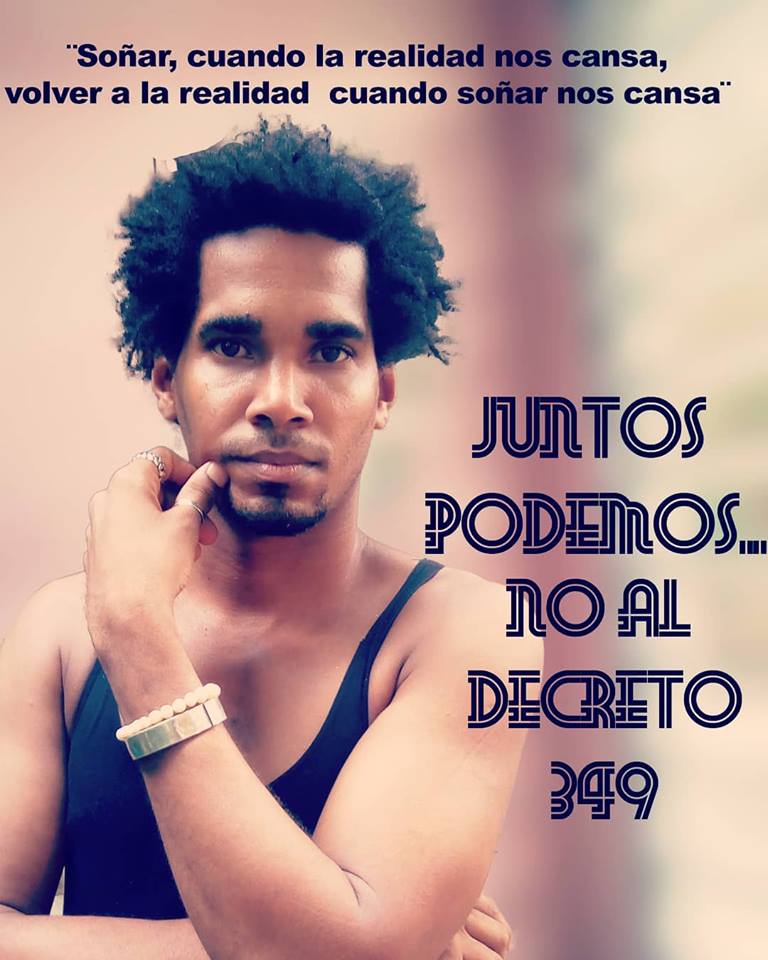
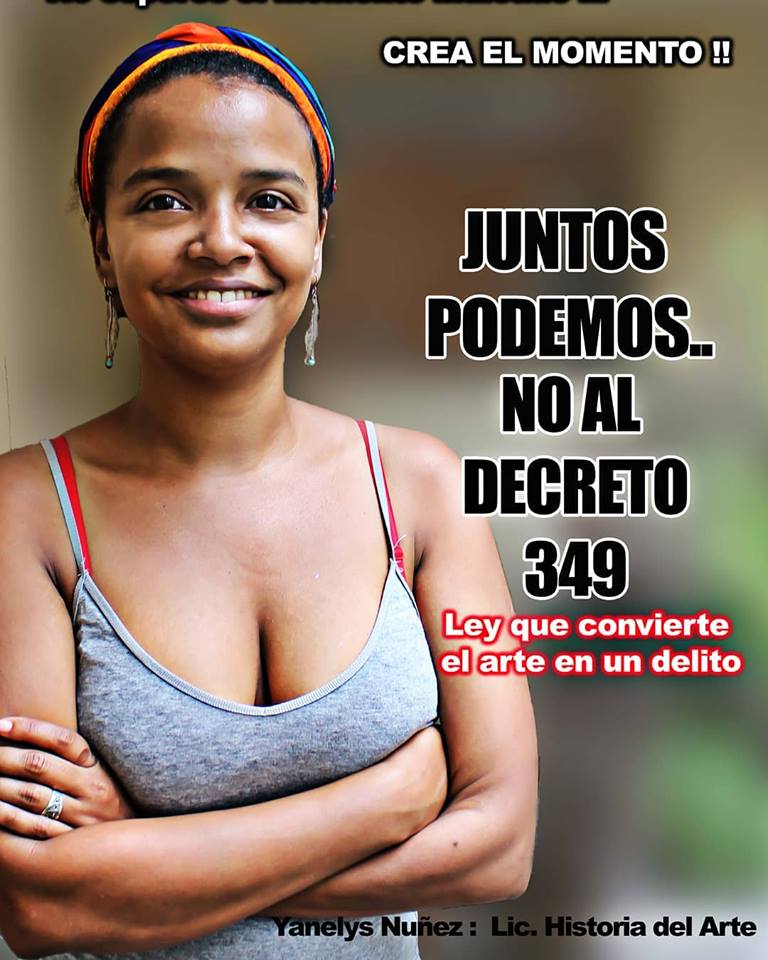
Cuban authorities arrested artists Yanelyz Nuñez and Luis Manuel Otero Alcantara from Otero Alcantara’s home sometime before 6:30am on Saturday 11 August for their role in organising a concert against Decree 349, a law allowing the government to sanction what art can be displayed or exchanged.
The pair are members of the Cuban artists collective the Museum of Dissidence, winners of the 2018 Index on Censorship Freedom of Expression Awards Fellowship for Art.
In a series of Facebook posts early that morning, friends and family said they didn’t know their whereabouts or what happened to them, stating that they had “disappeared”. Authorities denied knowing where they were.
It wasn’t until their release at 9:36pm that it was clear what had happened to them. During their time in detention, they were beaten and interrogated. Upon release, Otero Alcantara said: “Tomorrow we will continue the fight against the Degree 349.”
https://www.facebook.com/100014484485777/videos/439322859893860/?id=100014484485777&hc_ref=ARTkpBsSsWCxH2UFSnZDqPNuGBLHANFYaZ7uRKiRY55loJSDJPfAJvgxXpP416EHL0g
The meeting place for the concert was Otero Alcantara’s home, but when artists began arriving at around 8:50am they found the street had been blocked by police, who began beating participating artists, 30 of whom were also arrested. While this was happening police had surrounded the home and were intimidating Luis Manuel’s mother.
“We stand in solidarity with the brave artists and activists who, despite clear repression, stand up for fundamental human rights of Cubans,” Perla Hinojosa, fellowships and advocacy officer at Index on Censorship, said. “Arrests, violence and intimidation should never be responses to self-expression, and we call for such acts of censorship to stop. Any law that makes art a crime is unjust and we urge our supports to sign the petition against Decree 349.”[/vc_column_text][vc_row_inner][vc_column_inner width=”1/4″][vc_column_text]
[/vc_column_text][/vc_column_inner][vc_column_inner width=”3/4″][vc_column_text]
Index works with the winners of the Freedom of Expression Awards Fellowship to help them achieve goals through a 12-month programme of capacity building, coaching and strategic support.
Through the fellowships, Index seeks to maximise the impact and sustainability of voices at the forefront of pushing back censorship worldwide.
Learn more about the Freedom of Expression Awards Fellowship.[/vc_column_text][/vc_column_inner][/vc_row_inner][vc_row_inner][vc_column_inner width=”1/4″][vc_column_text]
[/vc_column_text][/vc_column_inner][vc_column_inner width=”3/4″][vc_column_text]
Index encourages an environment in which artists and arts organisations can challenge the status quo, speak out on sensitive issues and tackle taboos.
Index currently runs workshops in the UK, publishes case studies about artistic censorship, and has produced guidance for artists on laws related to artistic freedom in England and Wales.
Learn more about our work defending artistic freedom.[/vc_column_text][/vc_column_inner][/vc_row_inner][/vc_column][/vc_row][vc_row][vc_column][vc_basic_grid post_type=”post” max_items=”4″ element_width=”6″ grid_id=”vc_gid:1534159774557-297bf371-9804-2″ taxonomies=”23772″][/vc_column][/vc_row]
8 Jun 2018 | Americas, Artistic Freedom, Awards, Cuba, Fellowship, Fellowship 2018, News
[vc_row][vc_column][vc_column_text]
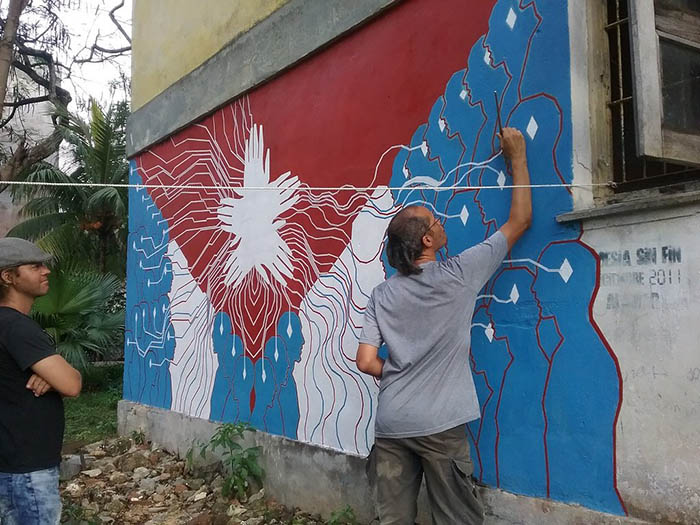
Cuban artist Yasser Castellanos
Despite official efforts to stop it in its tracks, Cuba saw the successful completion of its first independent art biennial, organised without the support of the state, on 15 May. Artist Luis Manuel Otero Alcantara and curator Yanelys Nuñez Leyva, members of the Museum of Dissidence, winner of the 2018 Index on Censorship Freedom of Expression Award for art, organised the ten-day #00Bienal de la Habana, which included over 170 artists, writers, musicians and theorists across nine different exhibitions in artists’ homes and studios around the country’s capital.
“Cuban culture is centralised culture and the government has absolute control,” Nuñez Leyva tells Index on Censorship. “The Ministry of Culture, together with all its branches such as the Union of Writers and Artists of Cuba and the National Council of Plastic Arts, are tentacles of the Ministry of the Interior, so all independent proposals, whether cultural, ecological or campaigns against gender violence, for example, are cursed with all the might of the government-controlled media.”
Even at schools pupils are served up propaganda intent on turning them against non-state-approved artists. Some art school students were shown a video portraying Otero Alcantara as a mercenary. “Such a campaign inevitably generates fear around independent projects which then suffer due to lack of both social and economic support,” Nuñez Leyva says.
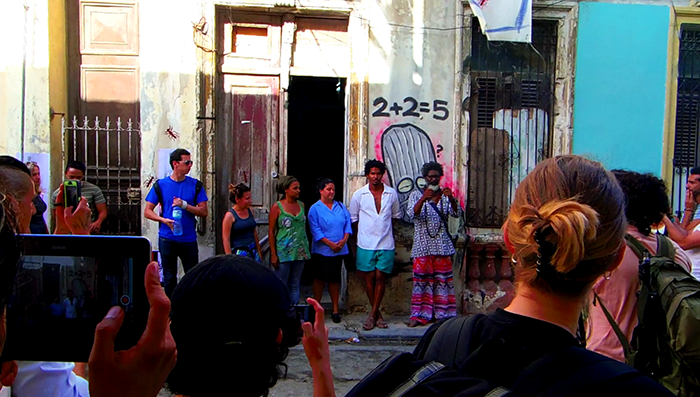
Economic support was one of the biggest obstacles for #00Bienal. “At the beginning, we thought that we would produce it with what we had at hand, but along the way we realised that we needed more,” Nuñez Leyva says. So a Gofundme campaign was set up, which raised $6,574. “But this wasn’t easy: the impact of the US blockade, our isolation from the world of networks and the impossibility of having credit cards made the process anguishing.”
Otero Alcantara was also imprisoned without cause on several occasions as part of the Cuban government’s campaign of harassment. Others who took part in #00Bienal, whether Cuban or foreign, received similar harassment. Many were even denied entry to the country, including the Cuban-American artist Coco Fusco.
When #00Biennial was announced in September 2017, the Cuban government immediately began to show its discontent through its cultural institutions. In an official declaration they branded the organisers as “unscrupulous people”. In response, #00Bienal’s first slogan was: “From the official to the unscrupulous.”
As culture is so tightly controlled in Cuba, only artists seen to be working in the interests of the regime can operate without restriction. Approved artists usually receive perks, something that gives them a higher status in society. Some artists risked all of this by taking part in #00Bienal. “The system used the worst blackmail against them because they gave the event a legitimacy that the government did not want,” Otero Alcantara says. “These artists were threatened by having their government accreditation taken away. Without this, they would find themselves without ‘official work’.”
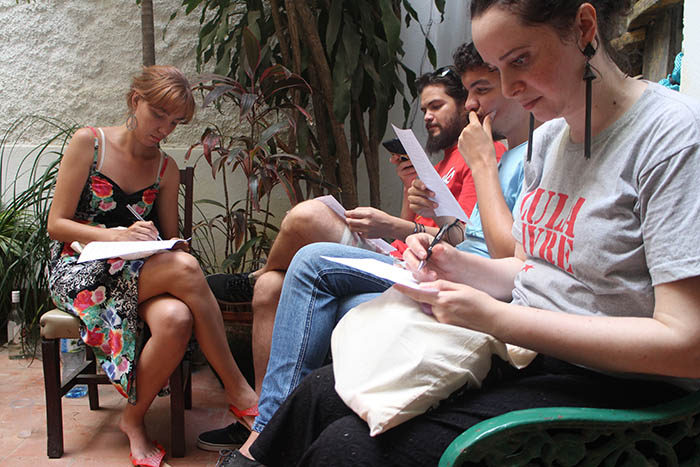
Government agents stalked the exhibitions while the organisers were accused of being in league with Cuba’s enemies. How does one respond to such accusations? “We responded by making an event that is as honest as possible, with a wide range of manifestations and artistic expressions that reflected the reality of Cuban art,” Nuñez Leyva says. “We responded with a list of more than 170 participants, not only Cubans, but from Mexico, Spain, Germany, the United States, Romania, Angola, Colombia, Denmark, Ukraine, Brazil, Venezuela, among them high-profile artists that Cuban institutions admire and collaborated with.”
The authorities even tried to prohibit the public from attending, sometimes successfully. Flyers and stickers were also confiscated. “But none of these actions were ever going to stop the energy of the event,” Otero Alcantara says.
“Despite all this pressure, the event went ahead, demonstrating that there is a group of people who are very courageous and have a real commitment culture,” Nuñez Leyva says. #00Bienal helped revive “a spirit of alternative rebellion” through the involvement of “countless numbers of totally unknown artists” that the state would never endorse.
For Otero Alcantara, the event’s success lies in the cohesion it created between artists, scholars and art enthusiasts, something that is unprecedented in the world of Cuban art. “We built an inclusive space of free creation and true collaboration between the people involved, exhibited the work of artists who were never going to have space in an official Havana Biennial and set a precedent for future projects,” he says. “This is one more step towards eliminating a fear that exists throughout Cuba.”
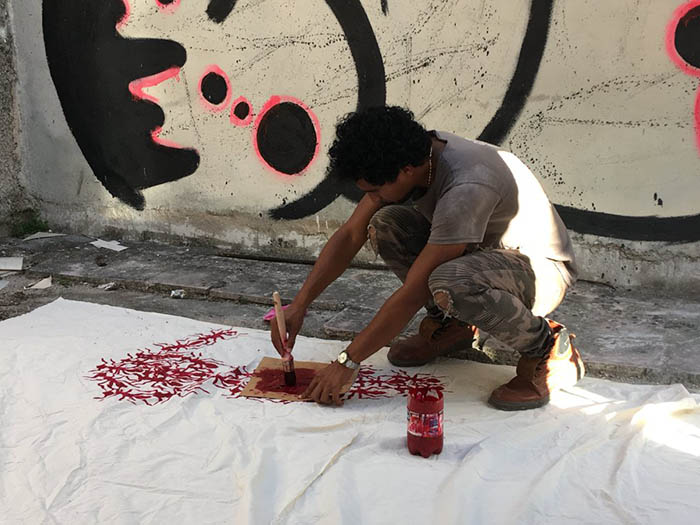
According to the organisers, the terms “revolution” or “revolutionary” have been hijacked and distorted by the Cuban regime. Such deformation has taken root so deep in the imagination of the Cuban people that just by mentioning the word “dissidence” is enough to be shunned, they explain.
“The #00Bienal was a humanistic project that brought to the fore essential values for any society such as unity, solidarity and collaboration,” Nuñez Leyva says. “The event also favoured the less privileged and created beauty and dialogue in favour of a new Cuba.”
The organisers of #00Bienal are under no illusions that life for Cuba’a dissident artists will magically become any easier under Cuba’s new president, Miguel Díaz‑Canel, who took over from Raúl Castro in April 2018. “The Cuban regime is more than any Castro,” Nuñez Leyva says. “It is a system based on a group of families that live both inside and outside the island, who have control over everything, which ultimately contributes to their own wealth.” This corrupt system relies on the deception of a people who have been left without even the strength even to protect themselves against poverty, she adds. “This situation leaves us with little hope, but we have to keep working.”
Otero Alcantara and Nuñez Leyva’s now want to show that #00Bienal wasn’t just a one-off, but is a serious project with longevity. “We will see if it is possible in two years to achieve something similar,” Otero Alcantara says.[/vc_column_text][/vc_column][/vc_row][vc_row][vc_column][vc_media_grid grid_id=”vc_gid:1528443291288-dfd45bff-0a16-7″ include=”100716,100712,100711,100710,100713,100709,100708,100707,100706,100704,100715,100705″][/vc_column][/vc_row][vc_row][vc_column][vc_column_text]
Artists, writers, musicians and theorists who took part in #00Bienal
Amaury Pacheco (Cuba), Iris Ruiz (Cuba), Coco Fusco (Cuba-USA), Tania Bruguera (Cuba), Reynier Leyva Novo (Cuba), Ernesto Oroza (Cuba), Gerardo Mosquera (Cuba), Katherine Bisquet (Cuba), Jose Ernesto Alonso, Yuri Obregón (Cuba), Alein Somonte (Cuba), Alejandro Barreras (Cuba), Anaeli Ibarra (Cuba), Alejandro Taquechel (Cuba), Ariel Maceo Tellez (Cuba), Aryam (Cuba), Aldeide Delgado (Cuba), Armando Cuspinera (Mexico), Antonio Mas (Spain), Alicia Torres (Spain), Ana Olema (Cuba), Alexis Ruiseco (Cuba-USA), Alexandru Raevschi (Germany), Andrés X (Cuba), Alain Aspiolea (Cuba), Alexandre Arrechea (Cuba), Antoni Muntadas (Spain), Biennial Project (USA), Boris González Arenas (Cuba), Colectivo Corason i uevo (Antonio A. Orta, Maykel Almenteros y Pedro Pablo Bacallao) (Cuba), Colectivo Guerrillas Girls, Celia y Yunior (Cuba), Colectivo 2.50 (Ana Gómez, Argelia Leodegarío, Marco Antonio Rodríguez, Itandehuitl Orta, Yuvia Pérez, Esmeralda Pérez) (Mexico), Carlos Manuel Álvarez (Cuba), Clara Astiasarán, Chu (Cuba), David de Omni, David León (Cuba), Danilo Maldonado (El Sexto), Diego Gil (Spain), Eliecer Jiménez Almeida (Cuba), Erish (Mexico), El Oficio (Cuba), Ernesto Hernandez Busto, Enfori García, Filipa César (Portugal), Fabián (2+2 =5) (Cuba), Francis Sánchez (Cuba), Francisco Méndez (Mexico), Francisco Masó (Cuba), Fabian Martínez, Filio Gálvez, Fredric Snitzer, Gabriel Coto (Cuba), Gerardo Stübing (España), Gean Moreno, Henri Eric Hernández (Cuba), Hamlet Lavastida (Cuba), Héctor Trujillo (Cuba), Hugo Patao, Italo Expósito (Cuba), Iván de la Nuez (Cuba), Jesús Hdez-Güero (Cuba), Jesús Benítez (Mexico), José Luis Marrero (Cuba), Josvan Gonzalez Agramonte (Cuba), Julián Yunda Yepes (Mexico), Jenifer Acuña (Cuba), Juan Melo (Colombia), Juan Carlos Alvarez Miranda (Cuba), Jean-Lorin Sterian (Romania), José Bedia (Cuba), Julio César Llopiz (Cuba), Javier Marimón, José Manuel Mesías (Cuba), Keyezua (Angola), Kevin Arrow, Lía Villares (Cuba), Luis Trápaga (Cuba), Luiso, Leandro Villanueva (Sam 33) (Cuba), Lester Dubé (Cuba), Lala Misosniky (Romania), La Alianza (Cuba), Liliam Dooley, Leandro Feal (Cuba), Lourdes Porrata, Miquel García (Spain), Marisol Maza (Mexico), Marcel Marquez (Cuba), Marianna Liosi (Germany), MO colectivo (Mariam Abrajim y Octavio Salazar) (Colombia), Magdiel Aspillaga, Mysora García, Nonardo Perea (Cuba), Natalia López (Colombia), Osmel Almaguer Delgado (Cuba), Osmany Carratalá (Cuba), Oscar Salamanca (Colombia), Orlando Hernández (Cuba), Pablo Pinto (Colombia), Polyanna Morgana (Brazil), Political Architecture: Critical Sustainability (PA:CS) (Denmark), Peter Menéndez, Rafael Carabano (Venezuela), Raúl Meriño (Cuba), Ras Yoe, Ricardo Figueredo, Rodolfo Peraza (Cuba), Rafael Domenech, Rirkrit Tiravanija, Svitlana Biedarieva (Ukraine), Soandry del Río (Cuba), Sandra Ceballos (Cuba), Santiago Alvarez Méndez (Colombia), Sandor (Cuba), Thiago Morandi (Brazil), Tomás Sánchez (Cuba), Tomas Vu, Tonel (Cuba), unx Pardo Ibarra (Colombia), Ulises Valdés (Mexico), Walfrido Valera (Cuba), Yaima Pardo (Cuba), Yasser Castellanos (Cuba), Yesica Suárez (Colombia), Yulier P. (Cuba), Yoenis Eloy Mayeta (Cuba), Yimi Konclase (Cuba), Yvelin Buenrostro (Mexico), Yucef Merhi (Venezuela), Yornel Martínez (Cuba), Yali Romagoza (Cuba), Yanier H. Palao (Cuba).[/vc_column_text][/vc_column][/vc_row][vc_row][vc_column][vc_basic_grid post_type=”post” max_items=”4″ element_width=”6″ grid_id=”vc_gid:1528443291296-0ad2c295-a239-7″ taxonomies=”104″][/vc_column][/vc_row]






